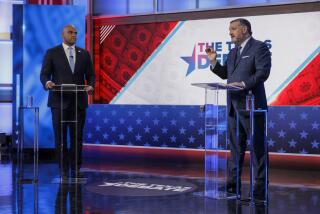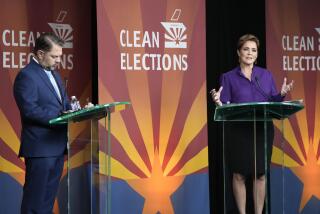Lively exchanges fill second GOP debate
COLUMBIA, S.C. — Ten Republican candidates for president, standing nearly toe-to-toe, teased out their differences over immigration, abortion and conservative purity Tuesday night in a feisty debate that sharpened distinctions among the party’s top White House contenders.
In one of the liveliest exchanges, former Massachusetts Gov. Mitt Romney deplored rival Sen. John McCain’s stand on illegal immigration. Romney said McCain’s plan for a “special pathway” to citizenship could turn out as “bad” as his signature campaign-finance reform law, which is widely reviled among conservatives.
The Arizona senator retorted with a biting remark on Romney’s pattern of switching stands on issues. “I haven’t changed my position
Such was the tone of the second Republican debate, a contrast with the first nearly two weeks ago at the Ronald Reagan Presidential Library near Simi Valley. Then, the 10 men in suits also stood behind lecterns in a line on stage, but this time they engaged and challenged one another more directly -- and often more pointedly.
Former New York City Mayor Rudolph W. Giuliani pounced at one of the least-known candidates, Ron Paul, when the Texas congressman suggested that terrorists struck the United States on Sept. 11, 2001, because “we’ve been bombing Iraq for 10 years.”
“That’s an extraordinary statement,” Giuliani snapped, then called on Paul “to withdraw that comment and tell us that he didn’t really mean it.”
The crowd of invited guests at the University of South Carolina roared its approval, but Paul did not back down. “I believe very sincerely that the CIA is correct when they teach and talk about blowback,” he said. “They don’t come here to attack us because we’re rich and we’re free. They come and they attack us because we’re over there.”
That set off a round of candidates shouting and clamoring to be heard.
The debate, sponsored by Fox News and the South Carolina Republican Party, put a new spotlight on Giuliani’s status as the only Republican in the field who supports abortion rights. Giuliani avoided the topic when it came up -- even after former Virginia Gov. Jim Gilmore cited Giuliani’s abortion position to question his conservative credentials. When pressed, Giuliani stressed his personal opposition to abortion and record of promoting adoptions in New York.
“I think we can agree, all of us on this stage, that we should seek reductions in abortion,” he said. “I ultimately do believe in a woman’s right of choice, but I think that there are ways in which we can reduce abortions.”
He also sought to frame his views in the context of a Republican principle of keeping government out of people’s private lives -- and the party’s larger interest in retaining the White House in 2008. “Republicans should be uniting to make certain that what the liberal media is talking about, our inevitable defeat, doesn’t happen,” he said.
The Republicans made Democrats -- and collusion with Democrats -- a target of frequent jabs. Former Arkansas Gov. Mike Huckabee defended his record of raising taxes by taking aim at Democratic White House hopeful John Edwards, who was recently embarrassed by news of his $400 haircut at a Beverly Hills salon.
“We’ve had a Congress that spent money like John Edwards at a beauty shop,” Huckabee said, vowing to rein in lawmakers in Washington.
On immigration, the candidates managed to quarrel even though their stated positions -- in favor of tougher border enforcement, opposed to unconditional amnesty for those in the country illegally -- were largely the same. For Romney and Giuliani, that has meant stepping back from remarks that were decidedly more immigrant-friendly before they joined the race.
Rep. Tom Tancredo of Colorado, who has made tough talk on immigration the hallmark of his recent years in Congress, took note. “It’s beginning to truly sound like a Baptist tent revival meeting here,” he quipped. “And I am glad to see conversions. But I must tell you, I trust those conversions when they happen on the road to Damascus and not on the road to Des Moines.”
McCain, who has led efforts in Congress to pass major immigration legislation, offered a rare pitch for bipartisanship, saying he worked with Democrats to find a solution because “that’s what the American people expect us to do. The status quo is unacceptable.”
The war in Iraq came up in the first round of questioning, and immediately opened fissures between the leading GOP candidates and those grasping to reach the top tier.
Romney, McCain and Giuliani all endorsed the deployment of additional troops and ruled out the setting of any timetable for withdrawal. McCain reiterated his statement from the first debate that failure in Iraq would mean terrorists would “follow us home” and strike on U.S. soil, a prospect echoed by Giuliani.
“Ft. Dix happened a week ago,” the former mayor said. “That was a situation in which six Islamic terrorists, who were not directed by Al Qaeda but claimed to have been inspired by them, were going to kill our military in cold blood.... We have to remind ourselves that we are facing an enemy that is planning all over this world and, it turns out, planning inside our country, to come here and kill us. And the worst thing to do in the face of that is to show them weakness.”
Sen. Sam Brownback of Kansas, however, reiterated his opposition to Bush’s Iraq policy and said it was important to reach a consensus in Washington for there to be any success in Iraq. “I think we’ve got to pull together here to win over there,” he said. “I mean, we’ve got far too many divisions in this government here. And we will win if we can pull together.”
Paul offered perhaps the most unusual twist in the discussion, citing President Reagan’s decision to pull U.S. troops out of Lebanon after a terrorist bombing. “Reagan addressed this subject in his memoirs. And he says, ‘I said I would never turn tail and run.... But I never realized the irrationality of Middle Eastern politics,’ and he changed his policy there. We need the courage of a Ronald Reagan.”
*
mark.barabak@latimes.com
More to Read
Get the L.A. Times Politics newsletter
Deeply reported insights into legislation, politics and policy from Sacramento, Washington and beyond. In your inbox three times per week.
You may occasionally receive promotional content from the Los Angeles Times.











